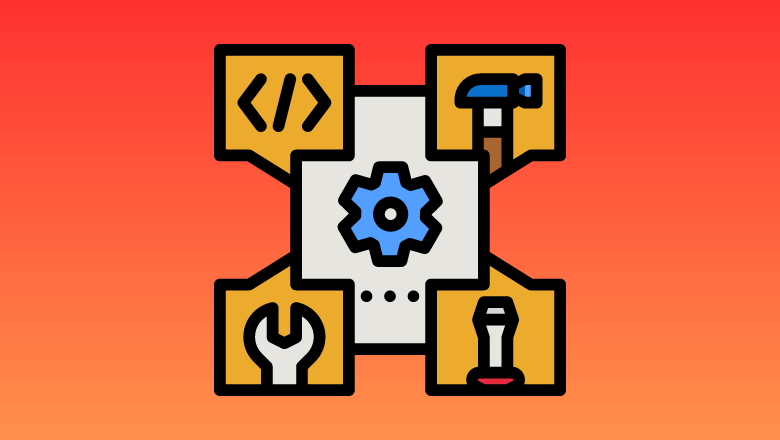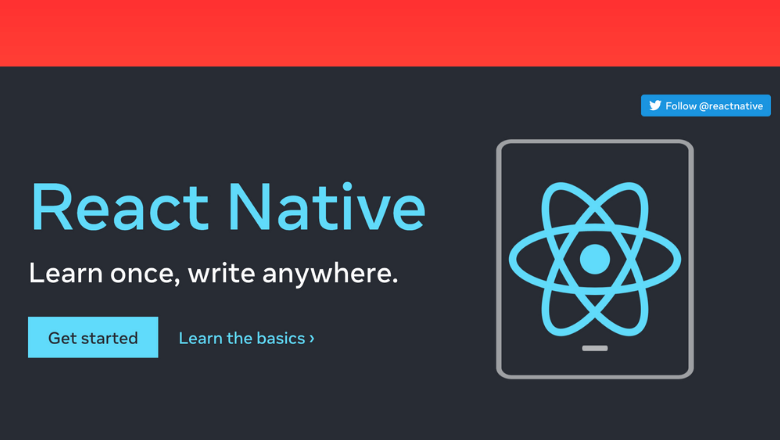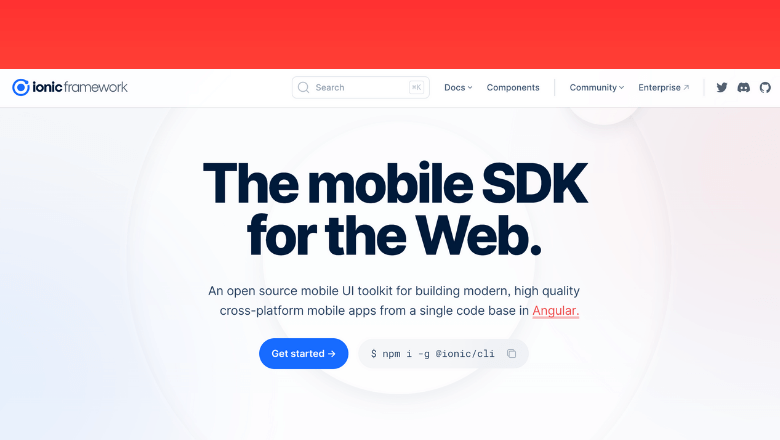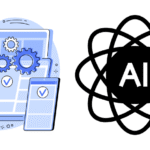Are you looking for the best hybrid development frameworks? Knowing which is best for your project can be challenging with many options.
Whether you’re working with mobile devices, web apps, or both, choose a hybrid development framework that fits your needs.

Best Hybrid Development Frameworks unlock the door to seamless app creation, empowering developers to conquer multiple platforms with a single codebase.
These frameworks enable you to create cross-platform applications without diving into the complexity of multiple programming languages or platform-specific tools.
So, without further ado, let’s jump into the world of hybrid development frameworks!
Key Takeaway: Hybrid Development Frameworks
Hybrid development frameworks simplify app creation for multiple platforms. With a single codebase, developers can build cross-platform applications that run seamlessly on Android, iOS, and other operating systems.
Exemplify: Hybrid Development Frameworks
Consider a situation where you must build an Android and iOS app. Save time and resources by writing the code once and deploying it on both platforms.
Pro tip: Choosing the Right Hybrid Framework
Selecting the perfect hybrid framework depends on the project’s requirements, the developer’s expertise, and the desired features. It’s crucial to consider these factors before making a decision.
React Native

React Native, developed by Facebook, is a popular choice for building cross-platform applications. It utilizes JavaScript and React, allowing developers to create native-like apps easily.
Key Takeaway: React Native
React Native’s component-based structure and performance optimizations make it a go-to choice for developers who want to create high-performing applications for multiple platforms.
Exemplify: React Native
Companies like Instagram, Airbnb, and Walmart have utilized React Native to develop their applications, showcasing their reliability and popularity.
Pro tip: React Native
To get the most out of React Native, familiarize yourself with JavaScript and React, as these form the framework’s foundation.
Ionic

Ionic is another widely used hybrid development framework designed for creating web-based applications that run on multiple platforms. It leverages Angular and Apache Cordova, enabling developers to craft apps with a native look and feel.
Key Takeaway: Ionic
Ionic’s wide range of pre-built components and its use of web technologies make it an excellent choice for developers who want to create feature-rich, web-based applications.
Exemplify: Ionic
Many successful apps, such as Sworkit and Untappd, have been built using the Ionic framework, demonstrating its versatility and dependability.
Pro tip: Ionic
To make the most of Ionic, it’s crucial to have a strong understanding of Angular and web development concepts.
Xamarin
Xamarin, a Microsoft product, is a robust hybrid development framework that uses C# for creating cross-platform applications. With it, developers can share up to 90% of their code across platforms.
Key Takeaway: Xamarin
With Xamarin, developers can create apps that feel native thanks to its ability to access platform-specific APIs and use native UI controls.
Exemplify: Xamarin
Notable apps built using Xamarin include Olo, UPS Mobile, and Alaska Airlines, highlighting the framework’s effectiveness in various industries.
Pro tip: Xamarin
A Strong C# and .NET background will help you excel in Xamarin development.

- Flutter
Flutter, developed by Google, is a UI toolkit that allows developers to build visually stunning applications for multiple platforms using a single codebase. It uses the Dart programming language, which has a syntax similar to JavaScript.
Key Takeaway: Flutter
Flutter’s hot-reloading feature and rich set of UI widgets make it an ideal choice for developers looking to build attractive applications with minimal effort.
Exemplify: Flutter
Apps like Google Ads, Alibaba, and Reflectly have been developed using Flutter, proving its capability to handle various applications and industries.
Pro tip: Flutter
To excel in Flutter development, invest time in learning Dart and understanding the ins and outs of the Flutter SDK.
PhoneGap
PhoneGap, also known as Apache Cordova, is an open-source hybrid development framework that leverages HTML, CSS, and JavaScript for building cross-platform applications. It has a vast ecosystem of plugins, allowing developers to extend their app’s functionality.
Key Takeaway: PhoneGap
PhoneGap’s support for web technologies and extensive plugin ecosystem make it suitable for developers looking to create cross-platform apps with familiar tools and languages.
Exemplify: PhoneGap
Popular apps like TripCase, HealthTap, and FanReact have been built using PhoneGap, showcasing its ability to create diverse and high-quality applications.
Pro tip: PhoneGap
A strong foundation in web technologies like HTML, CSS, and JavaScript will help you maximize PhoneGap’s capabilities.
Appcelerator Titanium
Appcelerator Titanium is a hybrid development framework that allows developers to build native-like applications using JavaScript. It utilizes the Alloy MVC framework and offers a range of modules and components for faster development.
Key Takeaway: Appcelerator Titanium
Appcelerator Titanium‘s Alloy MVC framework and its extensive components library make it an excellent option for developers seeking a streamlined development process with minimal boilerplate code.
Exemplify: Appcelerator Titanium
Applications such as Avis, Family Dollar, and Comerica have been developed using Appcelerator Titanium, demonstrating its adaptability and efficiency in various industries.
Pro tip: Appcelerator Titanium
Understanding JavaScript and the Alloy MVC framework will help you excel in Appcelerator Titanium development.
NativeScript
NativeScript is an open-source hybrid development framework enabling developers to build native applications using JavaScript, TypeScript, or Angular. It provides direct access to native APIs, ensuring high performance and a native-like user experience.
Key Takeaway: NativeScript
NativeScript’s ability to create high-performing, native-like applications using popular languages like JavaScript and Angular makes it an attractive choice for developers seeking optimal user experience.
Exemplify: NativeScript
Well-known applications, such as Strudel and Daily Nanny, have been developed using NativeScript, proving its potential for creating various applications.
Pro tip: NativeScript
To succeed in NativeScript development, it’s beneficial to have a firm grasp of JavaScript or Angular and an understanding of native API access.
Quasar Framework
Quasar Framework is a high-performance hybrid development framework built on the Vue.js ecosystem. It allows developers to create responsive, single-codebase web, mobile, and desktop applications.
Key Takeaway: Quasar Framework
Quasar’s integration with Vue.js makes it an excellent choice for developers looking to build cross-platform applications.
Exemplify: Quasar Framework
Apps such as QMapper and QCalendar have been developed using the Quasar Framework, highlighting its ability to create versatile and feature-rich applications.
Pro tip: Quasar Framework
To excel in Quasar Framework development, invest time learning Vue.js and familiarizing yourself with the Quasar CLI and components.
Felgo
Felgo is a hybrid development framework designed for building applications and games across platforms. It is built on the Qt framework and uses QML and JavaScript for rapid development.
Key Takeaway: Felgo
Felgo’s ability to create visually appealing applications and games across various platforms and its support for QML and JavaScript makes it an excellent choice for developers seeking an all-in-one solution.
Exemplify: Felgo
Popular apps and games like V-Play Soccer and Squaby have been developed using Felgo, showcasing its power and versatility in creating engaging experiences.
Pro tip: Felgo
A solid understanding of Qt, QML, and JavaScript will help you maximize Felgo’s capabilities.
Framework7
Framework7 is a full-featured hybrid development framework that allows developers to create iOS, Android, and desktop applications using HTML, CSS, and JavaScript. It has a comprehensive set of UI components and widgets for building modern, responsive applications.
Key Takeaway: Framework7
Framework7’s ease of use and support for standard web technologies make it an excellent choice for developers who want to create cross-platform applications with a modern design and responsive layout.
Exemplify: Framework7
Applications like Wappler and Grial UI Kit have been built using Framework7, demonstrating its ability to create visually stunning and feature-packed applications.
Pro tip: Framework7
Framework7 development requires a strong foundation in HTML, CSS, and JavaScript and familiarity with its UI components and widgets.
Conclusion: Choosing the Best Hybrid Development Framework
The hybrid development frameworks discussed in this article have unique strengths and weaknesses. Your choice should depend on your project requirements, technical expertise, and desired app features. Remember, there is no one-size-fits-all solution, so consider each framework’s strengths and weaknesses before deciding.
To recap, here are the six hybrid development frameworks we’ve covered:
- React Native – Ideal for creating native-like apps using JavaScript and React.
- Ionic – Perfect for developing feature-rich, web-based applications.
- Xamarin – Excellent for building cross-platform apps with C# and . NET.
- Flutter – Great for crafting visually stunning applications using Dart.
- PhoneGap – Suitable for developers familiar with web technologies like HTML, CSS, and JavaScript.
- Appcelerator Titanium – Efficient for creating native-like apps with JavaScript and the Alloy MVC framework.
You can build robust, high-quality applications that perform seamlessly on multiple platforms by selecting the best hybrid development framework for your needs. Happy coding!

Charlotte Williams is a talented technical author specializing in cross-platform app development. With a diverse professional background, she has gained valuable experience at renowned companies such as Alibaba and Accenture. Charlotte’s journey in the tech industry began as a mobile UX designer back in 2007, allowing her to develop a keen understanding of user-centric app design.
Proficient in utilizing frameworks like React Native and Flutter, Charlotte excels in building cross-platform mobile apps and imparting her knowledge to aspiring developers. She pursued a degree in Computer Science at Cornell University, equipping her with a strong foundation in the field. Residing in San Francisco with her three beloved dogs, she finds solace in hiking the hills and connecting with nature. Charlotte’s passion for app development, combined with her dedication to sharing expertise, makes her an invaluable resource in the world of cross-platform app development.






